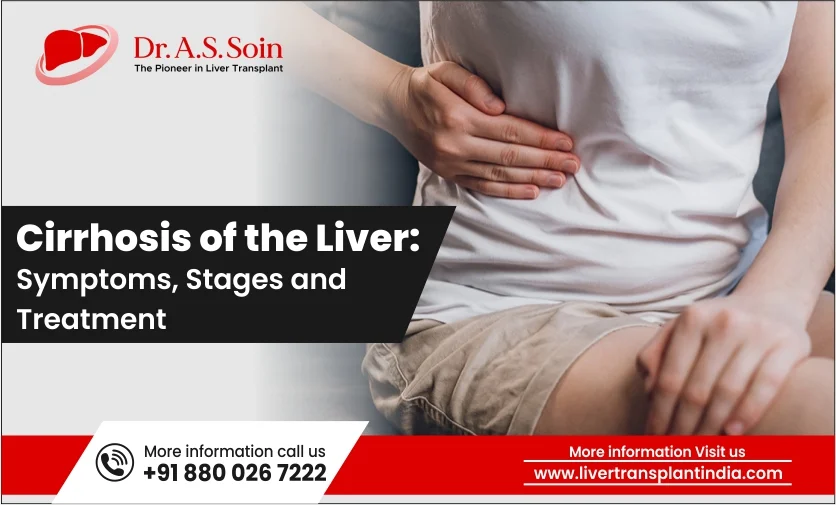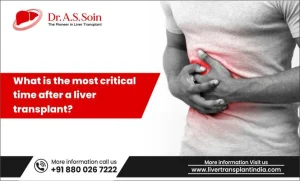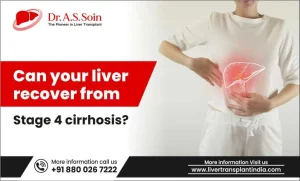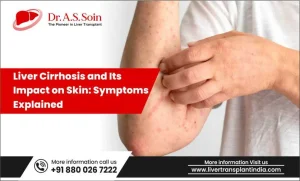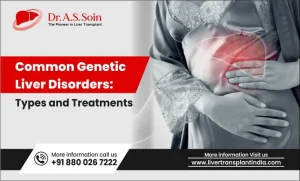The liver, one of the most vital organs in our body, performs numerous critical functions, such as storing nutrients, producing bile for digestion, and detoxifying the blood. However, when the liver undergoes chronic damage, it may develop cirrhosis—a serious condition that affects not only the liver but the entire body.
If you or someone you know has been diagnosed with liver cirrhosis, understanding the condition is the first step towards seeking appropriate treatment. At Liver Transplant India, under the leadership of renowned liver transplant surgeon Dr. A.S. Soin, comprehensive treatment options, including liver transplants, are available for advanced cases.
This article explores the causes, symptoms, stages, and treatment options for liver cirrhosis, along with life-saving interventions and lifestyle changes.
Table of Contents
ToggleWhat Is Liver Cirrhosis?
Cirrhosis refers to scarring of the liver tissue that occurs as a result of repeated injury. This damage could be caused by conditions such as fatty liver disease, viral hepatitis, or alcohol abuse. Over time, scar tissue replaces healthy liver tissue, impairing the liver’s structure and functionality.
The liver is known for its remarkable resilience and ability to repair itself. However, in cirrhosis, this self-repair process becomes overwhelmed, leading to irreversible damage. Often, symptoms are not noticeable until the disease has progressed significantly.
Symptoms of Liver Cirrhosis
Early Symptoms
In the initial stages, symptoms may be subtle or absent. As the liver’s capacity to function diminishes, the following signs may emerge:
- Persistent fatigue or weakness.
- Loss of appetite, often leading to unintentional weight loss.
- Mild pain or discomfort in the upper right abdomen.
These symptoms can easily be mistaken for minor issues. Ignoring them may allow the disease to progress unnoticed.
Advanced Symptoms
As cirrhosis worsens, more severe symptoms may appear:
- Jaundice: Yellowing of the skin and eyes due to a buildup of bilirubin.
- Swelling: Fluid retention in the legs (edema) and abdomen (ascites), often causing discomfort.
- Easy bruising or bleeding: Resulting from a decrease in the liver’s production of clotting factors.
- Mental confusion or memory loss: Known as hepatic encephalopathy, caused by toxin buildup in the brain.
Prompt medical intervention is crucial to manage these symptoms and prevent further damage.
Stages of Liver Cirrhosis
Cirrhosis progresses through distinct stages:
1. Compensated Cirrhosis
At this stage, the liver is scarred but still able to perform most of its functions. Symptoms are often absent, making regular monitoring essential.
2. Decompensated Cirrhosis
As the disease advances, liver function declines, and complications such as jaundice, fluid retention, and bleeding become apparent. Treatment focuses on managing complications and preparing for a potential liver transplant.
3. End-Stage Liver Disease (ESLD)
In the most severe stage, the liver can no longer sustain life without significant medical intervention, including a liver transplant.
Causes and Risk Factors of Liver Cirrhosis
Common Causes
- Chronic alcohol consumption: A leading global cause of cirrhosis.
- Viral hepatitis: Chronic hepatitis B and C infections are significant contributors.
- Non-alcoholic fatty liver disease (NAFLD): Often linked to obesity and diabetes.
- Autoimmune diseases: Conditions like autoimmune hepatitis cause inflammation and scarring of the liver.
Risk Factors
You may be at higher risk for cirrhosis if you:
- Are over 50 years old.
- Consume alcohol excessively.
- Have a history of viral hepatitis or metabolic syndrome.
Complications of Liver Cirrhosis
Without proper management, cirrhosis can lead to life-threatening complications, including:
- Gastrointestinal bleeding from varices.
- Spontaneous bacterial peritonitis (infection of the abdominal fluid).
- Hepatic encephalopathy (mental confusion due to toxin buildup).
- Liver cancer or complete liver failure.
Diagnosing Liver Cirrhosis
A thorough evaluation is essential for an accurate diagnosis. This typically includes:
- Physical Examination: Checking for signs such as jaundice, swelling, and tenderness.
- Blood Tests: Liver function tests to assess enzyme levels and clotting capacity.
- Imaging: Ultrasounds, CT scans, or MRIs to evaluate liver size, shape, and texture.
- Liver Biopsy: Occasionally performed to confirm the diagnosis and determine the cause.
Treatment Options for Liver Cirrhosis
While cirrhosis causes permanent scarring, early intervention can help slow or halt its progression. Treatment depends on the underlying cause and severity.
Lifestyle Modifications
- Abstain from alcohol: Essential for preventing further liver damage.
- Adopt a healthy diet: A low-sodium, nutrient-rich diet helps manage symptoms like fluid retention.
- Exercise regularly: Maintaining a healthy weight reduces strain on the liver.
Medical Management
- Medications to address complications such as fluid retention, infections, and hepatic encephalopathy.
- Vaccination against hepatitis A and B to prevent further infections.
Liver Transplant
For patients with advanced cirrhosis, a liver transplant may be the only viable option. At Liver Transplant India, our experienced team ensures seamless care from evaluation to post-transplant recovery, dramatically improving the quality of life for patients.
Preventing Liver Cirrhosis
Although some causes, like genetic disorders, cannot be prevented, many cases of cirrhosis are avoidable:
- Limit alcohol consumption or abstain completely.
- Maintain a healthy weight through diet and exercise.
- Get vaccinated for hepatitis B and take precautions to prevent hepatitis C.
- Schedule regular health checkups, especially if you have risk factors.
Conclusion
Liver cirrhosis is a serious condition, but it does not have to define your life. With early diagnosis, effective treatment, and expert care, many individuals lead fulfilling lives despite their diagnosis.
At Liver Transplant India, we are dedicated to guiding you through every step of this journey. Whether you need advanced medical treatments or a life-saving liver transplant, our team is here to support you.
Take the first step toward recovery today—contact Liver Transplant India for a consultation. Your health is worth the fight.

